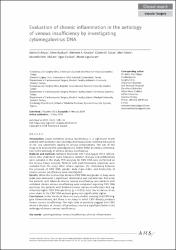Evaluation of chronic inflammation in the aetiology of venous insufficiency by investigating cytomegalovirus DNA

Göster/
Erişim
info:eu-repo/semantics/openAccessAttribution 3.0 Unportedhttps://creativecommons.org/licenses/by/3.0/Tarih
2022Yazar
Beyaz, Metin OnurBozkurt, Emre
Önalan, Mehmet Akif
Öztaş, Didem Melis
Meriç, Mert
Ulukan, Mustafa Özer
Coşkun, Uğur
Uğurlucan, Murat
Üst veri
Tüm öğe kaydını gösterKünye
Beyaz, M. O., Bozkurt, E., Önalan, M. A., Öztaş, D. M., Meriç, M., Ulukan, M. Ö. ... Uğurlucan, M. (2022). Evaluation of chronic inflammation in the aetiology of venous insufficiency by investigating cytomegalovirus DNA. Archives of Medical Science, 18(1), 129-132. https://dx.doi.org/10.5114/aoms.2019.85232Özet
Introduction: Lower extremity venous insufficiency is a significant health problem with economic and sociological consequences, lowering the quality of life, and sometimes leading to serious complications. The aim of this study is to evaluate the cytomegalovirus (CMV) effect on chronic inflammation in the aetiology of chronic venous insufficiency. Material and methods: Between November 2017 and August 2018, 468 patients who underwent radio-frequency ablation therapy and phlebectomy were included in the study. PCR analyses for CMV DNA were performed on the venous tissue samples. Patients with post-thrombotic syndrome were excluded from the study. After ethical approval, the relationship between the presence of CMV DNA, gender, body mass index, and bilaterality of chronic venous insufficiency were investigated. Results: When the relationship between CMV DNA and gender or body mass index was examined, a significant relationship was not detected. But when the patients with bilateral chronic venous insufficiency and patients with unilateral chronic venous insufficiency were compared regarding CMV DNA positivity, the patients with bilateral chronic venous insufficiency had significantly higher CMV DNA positivity (p = 0.002). Also, the incidence of venous ulcers in the CMV DNA exposed group was significantly higher. Conclusions: In the literature there are many studies showing that CMV triggers atherosclerosis, but there is no study in which CMV directly produces chronic venous insufficiency. The high rates of positivity suggest that CMV, which is the basis of chronic inflammation, may be a significant factor in the aetiology of chronic venous insufficiency.
WoS Q Kategorisi
Q2Scopus Q Kategorisi
Q2Kaynak
Archives of Medical ScienceCilt
18Sayı
1Koleksiyonlar
- Makale Koleksiyonu [3790]
- PubMed İndeksli Yayınlar Koleksiyonu [4251]
- Scopus İndeksli Yayınlar Koleksiyonu [6601]
- WoS İndeksli Yayınlar Koleksiyonu [6677]


















